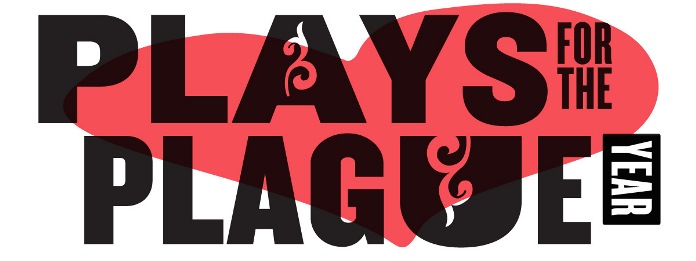With the COVID-19 closure of theaters on March 12, 2020, playwright Suzan-Lori Parks, a Pulitzer Prize winner and The Public Theater’s Writer-in-Residence, decided to put the time in lockdown to good use by writing a play a day. Originally scheduled to open at Joe’s Pub at The Public in November 2022, her anthology of Plays for the Plague Year was, ironically, shut down by the pandemic when she tested positive for the virus. It is now back on stage and playing a limited world-premiere engagement through the end of April at the intimate venue, in the format of a theatrical concert featuring the short plays and songs she created for a year and a month, from March 13, 2020-April 13, 2021, which offer both a personal account of her own experiences and emotions and a collective chronicle of what happened and the challenges we all faced during that difficult time.
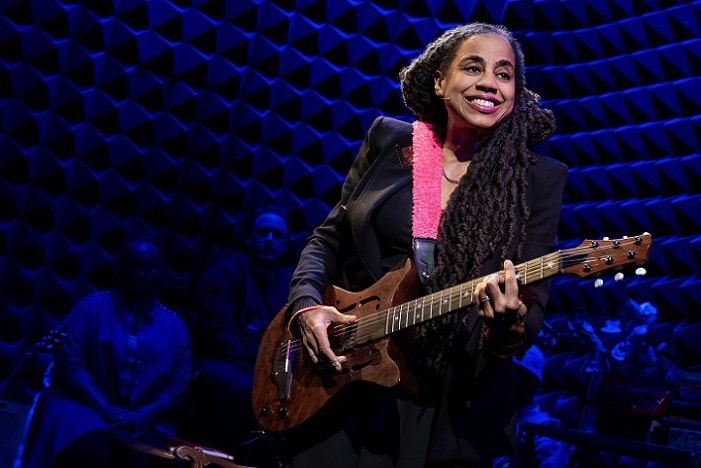
Identified only as “The Writer,” Parks, who portrays herself, sings, and plays guitar, is joined by a diverse cast of seven “Actors” (Rona Figueroa, Leland Fowler, Danyel Fulton, Greg Keller, Orville Mendoza, Lauren Molina, and Martín Solá) and accompanied by three musicians (music director Ric Molina on guitar, Graham Kozak on bass, and Ray Marchica on percussion) to deliver her sequential stories and songs, the dates and titles of which are seen on a digital screen above the stage. Together they trace the path of the pandemic from its beginnings, when little was known about the virus and the “hiatus” was only expected to last three weeks (a serious misjudgment that is referenced satirically throughout the show), through the days, weeks, months, and year spent in isolation as the death toll continued to rise (recorded on signs held by the cast), to healthcare workers being applauded for risking their lives to help others, the hope of a vaccine being developed and becoming available to the public, and the city, country, and world slowly starting to reopen.
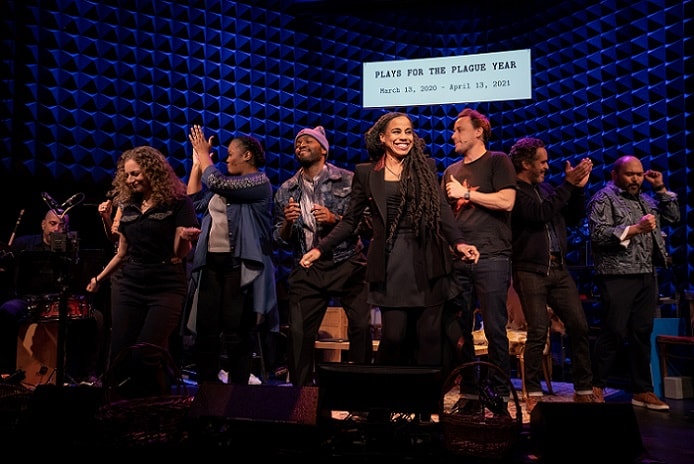
There are also tributes to the real-life people who were lost to COVID, racial violence, police brutality, and natural causes (among them, Parks’ teacher James Baldwin, who passed away in 1987, but here offers her some posthumous sage advice), and segments on the major socio-political events of the year, from the Black Lives Matter movement and official Juneteenth celebration to the contested presidential election and insurrection at the Capitol, and the legalization of marijuana in NYC, which we all saw unfold in the news and on TV. Most revealing are the vignettes of the impact the pandemic had on Parks, her family, and her work, which are interspersed throughout and tie the show together from her personal perspective, including her husband’s ongoing battle with long-term COVID, the remote schooling of their eight-year-old son and his early exposure to the realities of illness, death, and extended periods of separation from his quarantining parents, the projects she was working on that were cancelled or delayed, the uncertainty, stress, anger, and fear she felt during the worst of times, and her unfailing daily dedication to writing this anthology, with the ultimate mission, through the communal act of theater-making, “to give us some tools we need to process both what we’ve been through and what we’re still going through now.”
Directed and choreographed by Niegel Smith, the show (with a total of more than seven dozen short pieces and a nearly three-hour running time) flows quickly and smoothly from one mini-play to the next, and the painful memories they invoke and tears they elicit are alleviated by touches of humor, lively segments of original songs and dance in a range of styles, and the company’s frequent use of direct address, direct eye contact, clap-alongs and singalongs, movement through the house, and interactions with the audience (who are given the opportunity to write on cards attached to their programs what they want to remember and what they’d like to forget about the pandemic, a few of which are read on stage by the actors) – all contributing to an encompassing sense of humanity and spirit of community, with a life-affirming tone and recognition that we all went through this, are part of its history, and can find release and catharsis through the shared experience of theater.
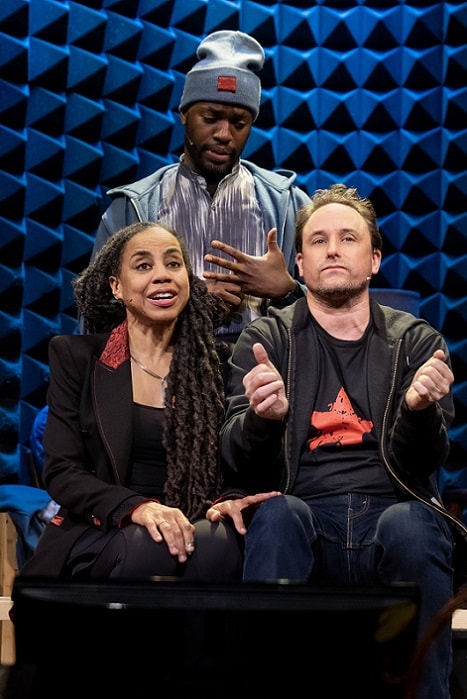
For that to succeed requires a thoroughly engaging, believable, and empathetic cast of triple threats, and Plays for the Plague Year has it. We are introduced to each of them, most performing multiple roles, in the opening song “I Play” (along with their portrayals of the actual figures are personifications of the Earth and the Virus); everyone has a featured scene and song in addition to their group enactments and vocal harmonies, and every one of them delivers the anguish, the triumphs, and the laughs, the singularity of their characters and the human connection among us, without a weak link among them. Most frequently appearing with the supremely talented Parks in the pieces with her family are Greg Keller as her afflicted but upbeat and loving husband and Leland Fowler as their son, who captures the boy’s childlike innocence and discovery, precocious intelligence and sensitivity, energy and joy (marked by hilarious bursts of laughter).
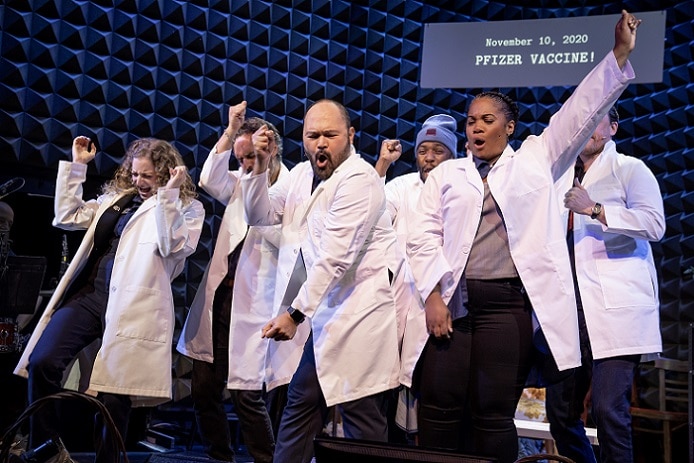
Peter Nigrini’s set creates the feel of Parks’ cramped one-bedroom apartment, which became increasingly claustrophobic during lockdown, while his projections keep us attuned to the date and significance of each chronological event portrayed, accentuated by Ania Washington’s lighting and sound by Dan Moses Schreier. Costumes by Rodrigo Muñoz identify the occupations and looks of the familiar names depicted in the plays, the elaborately dressed personifications with their recognizable attributes, and the family confined at home in casual everyday clothing, with efficient changes that maintain the show’s fluid pace.
Plays for the Plague Year provides not only the best of entertainment but also a chance to reflect on the events of the past few years and to come to terms with what transpired, what we’ve learned, and how to move on with purpose, healing, and happiness. Kudos to Suzan-Lori Parks and the entire cast and team for offering us this important opportunity.
Running Time: Approximately two hours and 50 minutes, including an intermission.
Plays for the Plague Year plays through Sunday, April 30, 2023, at Joe’s Pub at The Public Theater, 425 Lafayette Street, NYC. For tickets (priced at $30-60, plus fees), go online. Masks are no longer required but are recommended.


